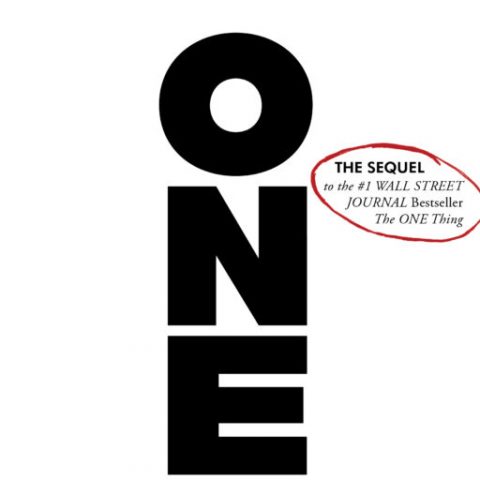In life, sometimes the simplest methods are the most effective. While this productivity method may seem complex initially if you're unused to the Focusing Question, it really is as simple as it sounds. Stop giving away your energy and time to many things at once, and focus on the One Thing that matters most.
What is the One Thing?

The One Thing is a book written about the concept of simplifying the greatest results from the smallest amounts of action and energy. It might even seem ridiculous at first, until you mention a productivity principle that most people have heard of before and can take to heart.
The Pareto Principle, more commonly know as the 80/20 rule, states that 80% of results of a given project or task come from only 20% of the effort. Simply stated, some actions generate a far greater amount of product or result than others. The Pareto Principle is meant to highlight that you should be more conscientious of how you're spending your time, as you can end up spending that 80% of effort to only produce a small amount of needed outcome. Something to note is that these two percentages are not perfect, nor do they directly tie into each other to hit 100%. The Pareto Principle could be 10% of the work produces 70% of the results, or other combinations. The underlying concept remains the same though.
The One Thing can be thought of as a supreme distillation of this idea - if you take 20% of your 20% of effort, and continue to do so until you reach just one single action or task, you're leveraging great results through doing the most important work.
The Focusing Question

How do we find out what that One Thing is? The authors bring forth a very key question that when practiced can dramatically alter your life.
What is the ONE Thing I can do, such that by doing it everything else will be easier or unnecessary?
Asking this question, and learning how to best answer it, creates the One Thing you should be working on to further your goal in the most effective way possible.
This question can be applied to multiple areas, and can be stacked in terms of time periods too - so that you're doing the One Thing today that helps you reach your One Thing for this week, which helps you reach your One Thing this month, and so on.
Try sticking to the immediate when you first practice it. The book goes into detail in applying it to multiple areas of your life too - definitely worth reading yourself.
Important Takeaways
The book doesn't just expound on the One Thing ad nauseam, but includes very insightful statistics, research, and concepts that help accelerate and bolster the One Thing. Here's a few that even outside of the context of the book are worth reviewing:
- Write Down Your Goals, and Share Them!
In a study from the Dominican University of California, 267 participants were recruited from a wide variety of professions and a variety of countries. Those who wrote down their goals were 42.1% more likely to accomplish them compared to those who did not.
Even more shocking, individuals who wrote their goals down and sent progress reports to friends were 77.6% more likely to achieve them compared to those who did not write them down. - Time Block and Give Time to your One Thing
The concept of 10,000 hours to mastery isn't new, but finding out how it applies to modern life can be difficult. As almost all productivity experts and studies have shown, the most effective way to schedule your time is to block out specific chunks of time for activities, and to stick to it!
The book recommends time blocking out 4 hours per day for your One Thing. This seems excessive, but when you extrapolate it over 10 years, 10,000 hours comes down to about 3 hours a day of practice. Do you want to master and excel your One Thing? Give it the time it deserves, after all it will yield the greatest results.
If disproportionate results come from one activity, you must give that one activity disproportionate time. - Be Aware of your Environment
Distractions and nuisances are commonplace today - when you sit down to do your One Thing, make sure that you protect your time. Make others aware that you're not reachable during this time, and if something absolutely needs to interrupt it, make up that time without any hesitation.
More importantly, be aware of who you interact with, and who you give your energy to. A 2007 study on obesity revealed that if one of your close friends becomes obese, you’re 57% more likely to do the same. What does this mean for spending time with people who aren't striving to reach their goals? What do people who are simply content with day-to-day affecting when it comes to developing your life into the one you truly want?
No one succeeds alone and no one fails alone. Pay attention to the people around you. - Seek Coaching and Mentorship
To truly make the most of your time, find those who have experience and can provide an outside perspective to your journey. The book quotes a study on top performers and comparing them to lower performers-
Ericsson's research on expert performance confirms the same relationship between elite performance and coach-ing. He observed that "the single most important difference between these amateurs and the three groups of elite performers is that the future elite performers seek out teachers and coaches and engage in supervised training, whereas the amateurs rarely engage in similar types of practice."
Make your One Thing a Reality
Combining all of these takeaways highlights the importance of community - sharing your goals with others to hold yourself accountable, surrounding yourself with other people who are also working on their goals, and seeking coaching and mentoring to accelerate your growth.
LUCO Studios was designed to help leverage all of these aspects into a simple and streamlined community to help you get to where you want to go faster. Even better, connecting with other people can help you spark new ideas and get insights you may never have come across otherwise, all while fostering friendship and a sense of belonging.
Not a member yet? Join for free today!








